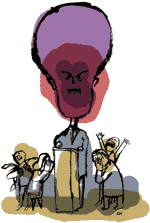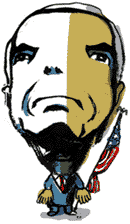Citing Proust, Bill Bradley today withdrew from the presidential campaign and grudgingly threw his support to Al Gore.
Citing Lincoln, Teddy Roosevelt, and Ronald Reagan, John McCain today suspended his campaign but stopped short of endorsing George W. Bush.
If you've missed everything that's happened in the election up until now, their respective exits gave you a pretty good idea what the Bradley and McCain campaigns were all about.

Bradley's statement was focused inward. Standing in front of black-and-white pictures of himself on the campaign trail, the former senator said he was "moving on" mentally and going on vacation physically. Most of his comments drew a contrast between his own political values and those of unnamed others (hint: four letters, begins with "G"). Others practice a politics "polluted by money"; Bradley (despite raising $20 million) is pure. Others live by polls and focus groups; Bradley speaks from his unshakable "core convictions." Others want to tear their opponent down; Bradley wants to lift people up. Others reflect the worst of "what is in us as Americans"; Bradley reflects only the best. Others pander to us; Bradley inspires us. That's because those others "secretly fear and distrust the people" while Bradley trusts them and considers them "the wisest guide of the public interest."
Perhaps the oddest moment in the speech was Bradley's comment that "while I'm bowing out, I'm not releasing the delegates that are on my side. They've been loyal supporters and deserve to have their voices heard." In other words, Bradley wants to make sure that he's not overlooked at the Democratic Convention--but rather than say he wants a role, he says it's his supporters who deserve their say. Bradley did not explain how forcing his delegates to continue to support him allows their "voices" to be heard. Should they happen to want to unify behind Al Gore before the convention, Bill Bradley intends make sure that their voices are not heard.
Marcel P. came in response to a reporter's question about what went wrong in Bradley's campaign. Checking first with his wife the literary scholar for the title Remembrance of Things Past, Bradley cited Proust's comment that after writing seven volumes, he knew what it was to write. This was Bradley's polite way of declining to answer the question. He was more petulant in declining to answer others. When asked whether "support" meant the same thing as "endorse," Bradley groused that "we have had this a number of times in the campaign. I'm not parsing words today." The reason he was supporting Gore, he said, was his belief in "the need to have a Democrat president." But while indicating his lack of enthusiasm about Gore in this way, Bradley declined to say explicitly that he was unenthusiastic about Gore. His tone during the question-and-answer session was one that has become familiar to journalists covering him: passive-aggressive irritation at being pressed to say things he didn't wish to say.

McCain's statement, by contrast, pointed outward. Standing in front of a postcard-perfect Arizona backdrop, he encouraged his supporters to continue fighting for the cause of political reform. Where Bradley was backhandedly boastful, McCain was movingly modest. He began by saying that he was "truly grateful for the distinct privilege of even being considered for the highest office in this, the greatest nation in the history of mankind." And instead of presenting himself as the embodiment of political and moral betterment as Bradley did, McCain presented reform as the unaccomplished goal of his campaign, a goal that he needed to find a new way to pursue. The essence of his statement was that he had yet to determine how to "help bring about the changes to the practices and institutions of our great democracy that are the purpose of our campaign."
To be sure, McCain talked about himself as much as Bradley did. But McCain did so without Bradley's grating solipsism. "I have been in my country's service since I was 17 years old," he said. "I neither know nor want any other life, for I can find no greater honor than service." Unlike Bradley, McCain didn't stick around to answer questions from the press. He also didn't indicate any ill will toward his opponent--though he surely feels it.
Bradley's speech had all the qualities of his campaign. It was dreary, sanctimonious, and narcissistic. McCain's had the qualities of his. It was jaunty, defiant, and uplifting. Bradley's speech made you feel sorry for him. McCain's made you sorry for us.
Illustrations by Robert Neubecker.